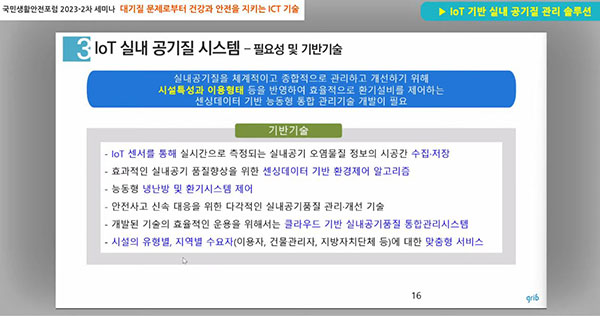코로나 팬데믹 이후 실내 공기 오염 관리에 대한 관심이 높아지는 가운데, 효율적인 실내공기질 통합 관리를 위해 IoT 센싱 데이터를 기반으로 클라우드 통합 관리 시스템이 필요하다는 전문가의 주장이 제시됐다.
실내 공기오염 관리, IoT 센싱 데이터 기반 달성
타솔루션 연동 일상생활 안전관리 시스템 적용
AI 기반 공기질 향상·화재감지·낙상사고 예방 기술
코로나 팬데믹 이후 실내 공기 오염 관리에 대한 관심이 높아지는 가운데, IoT 센싱 데이터 기반의 효율적인 클라우드 통합 관리 시스템이 필요하다는 전문가의 주장이 제시됐다.
국민생활안전포럼 주관 한국전자통신연구원(ETRI)와 한국지능형사물인터넷협회 후원으로 '대기질 문제로부터 건강과 안전을 지키는 ICT 기술' 세미나가 10일 유투브 온라인 채널에서 진행됐다. 이날 발표에는 IoT 기술을 통해 대기질 문제를 해결하는 솔루션들이 소개됐다.
(주)그립 정문교 전문위원은 "종합적으로 관리하고 개선하기 위해 시설특성과 이용형태를 반영해 효율적으로 환기설비를 제어하는 센싱 데이터 기반 통합 관리기술 개발이 필요하다"고 주장했다.
그립은 IoT 플랫폼 기반으로 스마트홈, 스마트 안전 관리 등을 지원하는 서비스, SI 역량을 활용한 융합 서비스 솔루션 전문 벤처기업이다. 핵심 통신 모듈과 IoT 기반 AIoT 미디어 플랫폼 중심으로 다양한 융복합 서비스 사업을 지원하고 있다.
게이트웨이 등 HW부터 그립 IoT 플랫폼, 스마트홈, 스마트 가전 등 SW까지 토탈 솔루션을 제공한다. 특히 LG유플러스와 홈 IoT 게이트웨이 최대 공급 실적을 보유하고 있으며, 플랫폼 기반 원격 모니터링 제어 데이터분석 지능적 서비스 개발 역량을 가지고 있다.
최근 실내공기 오염물질의 농도는 실외보다 2~5배, 최대 100배 정도 높아 아토피, 천식 등 질환을 야기하고 있다. 정 전문위원에 따르면, 대기오염으로 인한 사망자 수는 연간 600만명에 달하며, 실내공기 오염 사망자 수는 연간 280만명에 달한다.
실내 공기 오염 물질은 다양한 활동에서 발생된다. 인간 간 대화, 호흡 등에서부터 가구나 종이, 플라스틱, 담배 등 생활 및 사무용품과 건축 자재 등에서부터 오염된다.
이에 대응하기 위해 정부는 통합대기환경지수(CAI)를 제정해 대기오염도를 쉽게 표시 및 행동지침을 제시하고 있다. 실내 공기질(IAQ) 관리장치 관련 특허는 최근 10년간 연평균 15% 증가하며 관심이 지속되고 있다. 국내 공기청정기 시장은 2조9천억원에 달한다.

그립 정 전문위원은 클라우드 기반 통합 공기질 통합관리 시스템에 대해 소개했다. IoT 센서를 통해 실시간으로 수집된 실내공기 오염물질 정보는 게이트웨이를 통해 실내공기질 통합관리 시스템에서 통합된다. 이는 가상화 서버, 수집 가공 서버, 데이터 저장 서버로 구성된다.
실내공기질 통합관리 시스템 서비스 모듈은 IAQ 통합관리 및 서비스 모듈, 시스템 제어모듈, 외부시스템 연동 모듈, 데이터 수집 모듈 등 4가지가 있으며 이는 유기적으로 연결돼 효율적이고 체계적인 관리 방안을 제시한다.
특히 그립에서는 공기질 관리 솔루션을 제공함과 동시에 다른 솔루션을 함께 연동함으로써 효과를 극대화했다.
예컨대 단체 급식당에서는 공기청정살균기와 화재예방 시스템과 연동해 실내 공기질을 관리한다. 주방에서 온도 알람으로 화재를 사전 예방하고, 라이다 센서로 조리원의 이탈을 방지한다. 또한 실내 복합 화재 감지기를 통해 연기 및 일산화탄소 감지로 화재 감지 역량을 강화한다. 또한 요양원에서는 낙상감지 솔루션을 더해 노인 안전을 함께 제공한다.
정 전문위원은 "국내 IoT 기반 주방 화재예방 및 실내 공기질 관리 솔루션으로 사회 현안 문제 해결을 기대해 볼 수 있다"고 말했다.
또한 그립은 실내공기 관리 시스템, 통신 및 관제시스템의 단순화를 위해 복합 공조기를 전문 개발업체와 협력해 개발했다. 냉난방기, 공기청정기, 환기장치, 가습기를 올인원으로 제공한다.
정 전문위원은 "세계 최초 하이브리드 공조기 마이크린S를 개발해 기존보다 투자, 에너지, 유지보수, 설치 비용을 최대 50% 절감할 수 있다"고 말했다.
마지막으로 정 전문위원은 AI 기술을 공기질 향상에 달성할 수 있을 뿐만 아니라 일상생활의 안전관리 솔루션에 적용할 수 있을 것이라 강조했다.
IoT 디바이스에서 측정 및 수집한 센싱 데이터를 기반으로 안전관리 서비스에 활용하는 사례가 제시됐다. 낙상 사고 발생을 모니터링하고, 알람을 송출하는 비전 AI 시스템, AI 기반 예측을 통한 에너지 절약 실내공기 제어 등이다.
IoT 및 클라우드, AI 기술을 통해 생산성과 수익률 향상의 효과를 기대할 수 있을 뿐만 아니라 우리의 일상생활 전반에서 건강과 안전을 지킬 수 있을 것으로 기대된다.